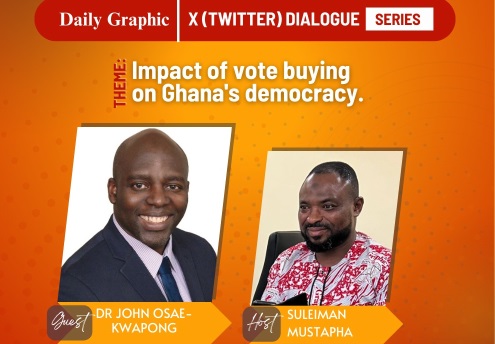
Daily Graphic X (Twitter) Spaces: Dr Osae-Kwapong advocates more awareness against vote buying
A political scientist, Dr Osae-Kwapong, has advocated an open primary system for political parties where all registered voters of a party would participate in the election of a candidate as opposed to the delegates system as a measure to cure the vote buying phenomenon in local elections.
Advertisement
That, he said, was because vote buying was more popular during primaries since a smaller pool of individuals became the electorate, and as such made it easier for candidates to reach and influence them.
An open system, he said, would therefore make the buying of votes very expensive and could then deter candidates from engaging in it.
Dr Osae-Kwapong, who is a Fellow at the Centre for Democratic Development (CDD-Ghana), was speaking on a live discussion on X Spaces (formerly Twitter) hosted by the Daily Graphic yesterday on the theme: “The Impact of Vote Buying on Ghana’s Democracy”.
He also advocated the setting up of a public fund to support the activities of political parties to make the electoral process more transparent to engender monitoring, receive reports on activities, and to draft regulations to make the whole process a lot more levelled.
He called for increased public awareness of the negative effects of vote buying on the nation’s democracy to cure the canker.
He said people had to understand that selling their votes could land the wrong person in office, and that once that happened, the tenets of democracy, including transparency, merit and particularly good governance, would get eroded which could be detrimental for our socioeconomic development.
“A lot of public education would have to go into this.
The National Commission for Civic Education would have to put it into the agenda as we go into 2024, and hammer on the point that we don’t want this to become a permanent feature of our political process and elections,” he said.
No guarantee
Dr Osae-Kwapong, who is a Democracy and Development Fellow at the centre, said candidates also needed to be reminded that buying votes did not necessarily guarantee an electoral victory, hence the need to discourage them from engaging in the untoward behaviour.
He explained that research data, pre-election surveys and real-life instances had indicated that many electorate were always willing to accept money from politicians but were not necessarily ready to vote them into office.
“I don’t know if you remember some of the videos from the Assin North by-election where videos (emerged) of some voters jubilating that they took money from a particular candidate but voted the way they wanted to vote,” he said.
“That, for me, was one of the clearest signs to candidates that no matter your investment, you have to have that reality check that it doesn’t guarantee that you would win; it may help, but it doesn’t guarantee a win,” Dr Osae-Kwapong stressed.
Prosecution, state financing
Speaking on the prosecution of perpetrators of the act, the political scientist said there were enough laws to punish individuals who engaged in vote buying, stressing, however, that effective enforcement remained the obstacle.
He explained that proving the motive of vote buying was difficult, saying “you would have to witness the vote buying, report it, have evidence; the authorities would have to investigate it.
So, a legal approach presents its own challenges even though it’s a tool which can be used”.
Dr Osae-Kwapong said in addition to the moral approach of appealing to the conscience of both candidates and electorate, authorities could pursue a state-financing scheme for political parties.




